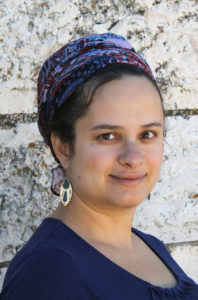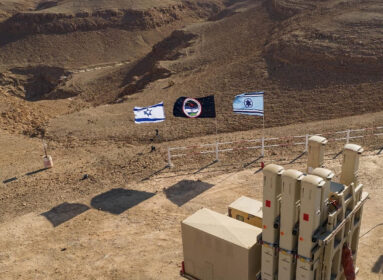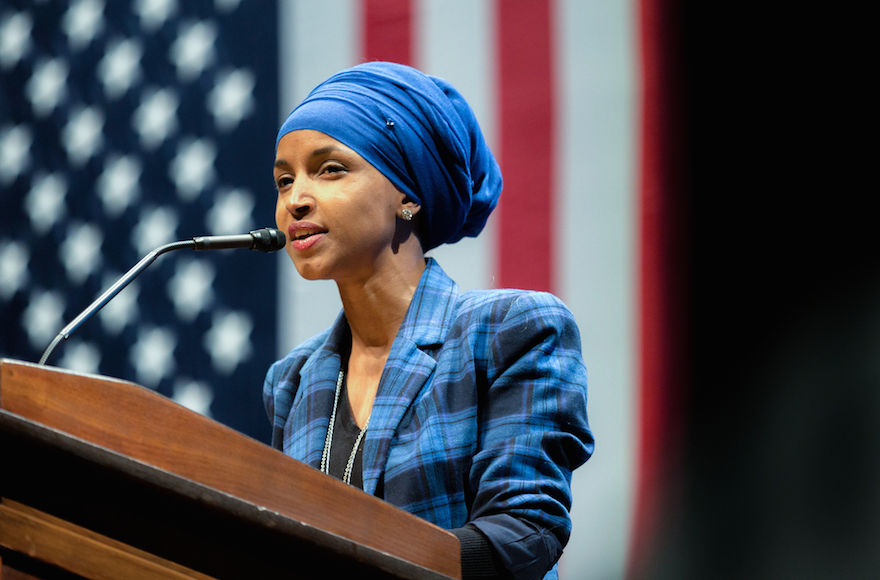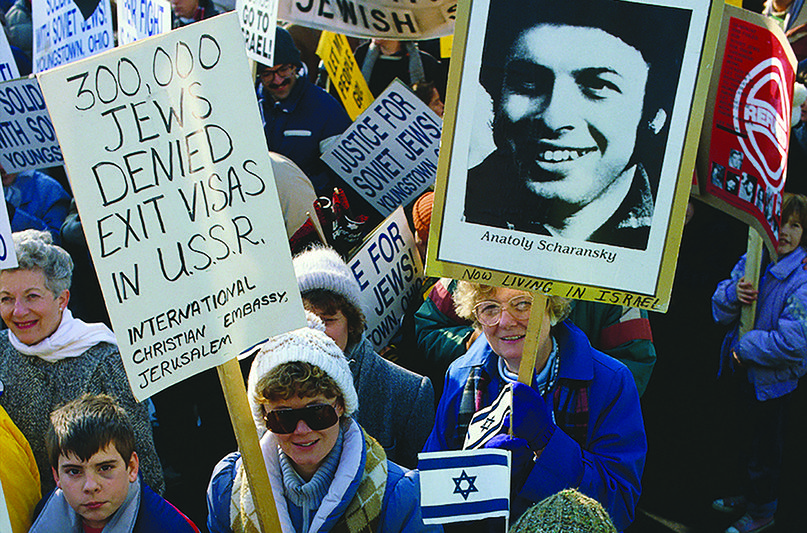
Daughter of legendary “refusenik” Natan Sharansky will be scholar-in-residence in West Hartford
By Stacey Dresner
WEST HARTFORD – Every year on the anniversary of the day her father was released from a Soviet prison in 1986, Rachel Sharansky Danziger’s family celebrated with a “seder.”
“My dad would tell us stories and then me and my sister would ask questions and my parents would give us answers. And the questions changed and evolved as we grew up. They started with, ‘Were there animals in prison?’ and made it all the way to ‘How did you maintain your ability to relate to each other as husband and wife so that 12 years after you were separated you were able to go on with your marriage?’”
Rachel, the eldest daughter of Natan Sharansky, the refusenik who spent nine years in Soviet prisons for treason, and his wife Avital, who fought passionately for his release – says that there was never a time when she wasn’t aware of her parents’ experiences, which to most of the world symbolized the Soviet Jewry movement.
“We grew up knowing about the struggle. I can’t remember a time when we didn’t know about the struggle,” she says.
As scholar-in-residence at Beth David Synagogue Nov. 2-3, Danziger will discuss that struggle during her talk, “Couches and Tables and Tents: Lessons from the Struggle for Soviet Jewry.”
“Growing up as I did, the victory in that struggle is the one complete and well-known truth of my existence, because I wouldn’t have been here otherwise. I wouldn’t be alive if it didn’t work,” Danziger says. “It made me believe certain things, or know certain things about our ability as Jews to work together despite our many, many differences.
“This was something that was, I feel, such radical knowledge, but also practical knowledge in terms of our own family; we were different, our friends were all different, and we were all a part of this big social network and we all loved each other,” she says. But then I grew up and in my daily life – where we don’t usually fight against an evil empire – all those lessons came into question and I had to kind of ask myself, ‘How are those truths that I grew up with relevant to our daily lives as Jews? How can we make them applicable?’”
These are also some of the questions Danziger tackles in her blogs for The Times of Israel, and which she has discussed on websites such as Tablet and Kveller.
At a kiddush lunch on Saturday, she will lead “What We Can Learn From Story-telling?” teaching the story of Yitzchok and Rivkah’s first encounter.
“What I love about storytelling is that it creates order out of chaos,” Sharansky Danziger explained. “It takes events and characters and words and structures them into a process we, the audience, can then discuss and through that process we can find meaning. And as someone who is interested in leading a meaningful life, I think we wouldn’t be able to do it without stories.”
This scholar-in-residence weekend is the handiwork of Beth David member Ben Abrahms. He and Rabbi Yitzchok Adler were in the audience when Danziger interviewed her father about Israel at the AIPAC Policy Conference in Westington D.C. last March.
Abrahms contacted Danziger through his aunt, Sally Abrahms, a blogger and an acquaintance of Rachel’s who helped make the shidduch.
“I thought that Rachel would make a great scholar-in-residence because during her interview with her father at AIPAC she spoke about how the American Jewish community came together to help Soviet Jews despite great differences within the American Jewish community,” Abrams says. “The diaspora community in the 1980s was just as divided as today, but still united for that larger cause. That idea is critical today, when our community seems so divided. I also was fascinated by her perspective growing up and living in Israel as a proud Jew after what her parents went through. I later read her writing about various topics on Israel and Judaism, and that reinforced my belief that she would be a great scholar-in-residence.”
Says Rabbi Adler, “The main theme of the public conversation she shared on stage with her father, had to do with diversity and the respect for differences in attitudes and thinking, and that families do not become weaker when they embrace diversity, but rather they can become stronger because of the love that is engendered through mutual understanding.”
Bigger than any one group
Rachel and her sister, Hannah, who is three years her junior, grew up in Jerusalem in Beit Hakerem, a neighborhood in Jerusalem. (Today, Hannah is a social worker in Jerusalem.)
“It was on the edge of what used to be wilderness… with rocks and hills, and deer and wild rabbits and turtles,” she recalls. “All of my childhood was exploring nature there and finding wildflowers and figuring out what they were called and when did they bloom, and bringing turtles home from our walks and then putting them back out in nature.”
Around 1990, much of her old neighborhood was demolished to make way for the Begin Highway, which runs across Jerusalem.
She doesn’t like to label or define her upbringing.
“Normal definitions don’t fit my family. We went to a religious Zionist school and most of our friends were religious Zionists. My mother would describe herself as religious-Zionist, my dad was somewhat religious,” she says, with a little laugh, “but definitely a Zionist.”
“We had many family friends who were not religious or were Conservative or Reform or more Orthodox than us in the way we use the word. I grew up with a sense that definitions are not very important.”
Today, she is observant, falling within the Modern Orthodox camp.
Still, she says, “I don’t like definitions.”
Rachel prefers not to talk about what kind of parents her mother and father were – that’s too private.
Growing up, says Danziger, her parents “were careful to make sure the limelight they lived in wouldn’t touch upon us, that we would still have private lives and we would grow up as normal children. And they really made an effort. Looking back, I am very appreciative of that.”
While her parents were the poster children for the Soviet Jewry movement, she says she was not really raised in the “bubble” of the Russian-Israeli community that some of her current Russian friends were.
“My father was friends with people from America and other English-speaking countries not with just one group,” she said. “A lot of our circle growing up were family friends that my parents acquired during the days of the struggle. So this was Jews from all over who remained connected to each other and identified with each other through their partnership in this thing that was bigger than any one group.”
That ‘thing that was bigger than any one group’ helped to make Danziger the strong, confident woman she is today.
“We grew up with the story [that was related] as a story of triumph and a story of ‘Look what we can achieve when we work together…when we really stick to our principles and a principled position.’ For me it was incredibly empowering. I grew up feeling like we can do anything when we really put our minds to it.”
Danziger emphasizes that she did not harbor ill will towards Russians.
“I wasn’t angry at the Russians. Being angry at the Russians would be something like being angry at a hurricane. They were not the people in my story. The people in my story were the people who marched or who wrote letters or who survived prison; the people who fought and fought and fought to make victory happen,” she says.
Danziger earned a BA in Philosphy and Liberal Arts and an MA in American History, with an emphasis on the Colonial period, from The Hebrew University of Jerusalem. Her thesis was on pre-Revolutionary War Connecticut. She became interested in that subject after reading a book about the Puritans.
“It was a book in Hebrew written by an Israeli professor about the Puritans and about how they came up with all of these utopian ideas about what society should be like. … I read this book and it really rang a bell, it hooked me because as a Zionist and as a religious Zionist, I recognize these kinds of emotions. That ‘we can build something great; we can build something better. We are not just building a new country, we are also going to build the ideal utopian country. Many people have many dreams they are trying to enact in this new country and those dreams clash and you have to compromise. Reality is complicated with all those disappointments and frustrations. But the Puritans back in the day felt very familiar.”
For the past year she has had the chance to hang out in Puritan territory. She, her husband Michael Danziger (who grew up in Los Angeles and made aliyah at the age of 17), and their three children are living in Boston while Michael does his post-doctorate work at Northeastern University.
Given her academic background, she likens living in Boston to “being a kid in a candy store …As soon as we got ourselves a little settled, I took my baby went exploring. We went to see the graves of the people I researched and went to see all the historical sites.”
Her eight-year-old son and five-year-old daughter attend Shaloh House, an “amazingly warm and welcoming” Jewish school in Brighton, where the family usually attends Kodimah Toras Moshe synagogue.
“The nice thing about the Jewish community here is that while there are a lot of shuls, the feeling is that we are part of one big community. We go to other shuls and others people come to our shul. It’s a very interconnected and welcoming Jewish community,” she says.
She continues to blog and writes her own personal blog, “Imaleh.Li: Parenting, Judaism and Other Crazy Journeys.” And she is the founder and chief editor of Jerusalem Moments, which celebrates “the 50th anniversary of Jerusalem’s reunification by sharing different people’s ‘Jerusalem Moments’- the images, stories and artwork that capture Jerusalem as they experience it.”
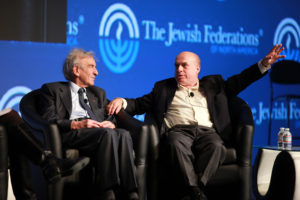
Nobel laureate Elie Wiesel z”l (left), and then-Jewish Agency for Israel Chairman Natan Sharansky, the former Soviet refusenik, at the General Assembly of the Jewish Federations in North America in Baltimore discussing the Soviet Jewry movement and marking the 25th anniversary of its pinnacle event, The March on Washington, Nov. 12, 2012. (David Karp)
She says she became a non-fiction writer by chance.
“I kept feeling that I had something to say. Things were happening in Israel and in the world of social media you can see what a lot of people are thinking, but often the voices that are most heard are the extremes, from the right or from the left. I kept feeling frustrated with these voices. There really should be more people speaking from the reasonable center.”
In the summer of 2014 when three Israeli teenagers, Eyal Yifrach, Naftalki Fraenkel and Gilad Shaar, were kidnapped and murdered, she needed to express herself.
“There was so much negative emotions both from the left and right that I just had to kind of pause and say, ‘If I have something to say it is my responsibility to say it. It is our responsibility to say it.’”
She opened her blog on Times of Israel’s free blogging service and started writing about everything from Soviet Jewry to American Jewry and from domestic abuse and equal rights to parenting, often citing a corresponding holiday or Torah portion.
And of course, she wrote about her beloved Jerusalem.
“I’m very in love with Jerusalem,” she says.
When it comes to speaking about the Jewish community in Russia today, she demurs. “I’m not an expert,” she explains.
“I can tell you that there is cause for concern with trends in Russia today – in terms of backing out of democratic advances, and backing out of civil and human rights. Which definitely can, and I suspect does, impact the Jewish community in some ways. Though I think we don’t know yet where it is going to end.”
She treads delicately when speaking about the standing of former Soviet olim in Israel today.
As for Israel’s Russian olim – immigrants – she says: “Every aliyah brings with it a unique set of challenges, since it introduces different cultural patterns and needs into Israeli society. The olim from the former Soviet Jewry are no different. The concentrated Soviet effort to erase Jewish identity in the USSR left many of the olim uniquely disconnected from our history and heritage, and made it hard for them to find their place in Israel’s traditional-minded majority. The pressure to seek professional and academic excellence as a way to avoid persecution in the USSR means that many of the olim find the education system in Israel, and the job openings they had to compromise for, disconcerting at best. And some of these experiences continue to shape the experience of these olim and their children today. At the same time, the need to integrate the Soviet olim reshaped Israel. Every aliyah contributes something to our versatility, dynamism, and resilience; and I believe Israeli society is the better for it.”







 Southern New England Jewish Ledger
Southern New England Jewish Ledger